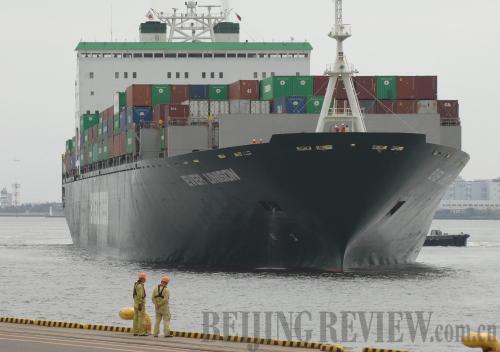|
 |
|
FOREIGN TRADE RELIANCE: A cargo ship arrives at a Tokyo container port on April 19 (XINHUA) |
Hu said that some DPJ parliament members headed by former Prime Minister Hatoyama are not satisfied with the Noda administration's policy of increasing the sales tax and restarting nuclear power plants. For example, Hatoyama said on July 7 that the Noda administration's decision had betrayed the DPJ's promise of not elevating the sales tax within four years. These dissenting parliament members worried the sales tax hike might hurt the country's domestic demand. If they choose to leave the party, the DPJ will be incapable of handling any non-confidence motion against the cabinet inside the lower house, Hu warned.
To the DPJ, Ozawa's split might end its ruling position of the past three years. The parliamentary elections are scheduled for next year. Noda promised to dismiss the parliament and hold the general elections earlier, so as to get the LDP's support in passing the sales tax hike bill.
Hu said Japan may have the parliamentary elections this year, and the DPJ's prospects for a strong showing are weak. However, Ozawa's new party is not strong enough to compete with the DPJ and the LDP, so if neither of the two major parties can get the majority of the lower house seats, Japan will have a coalition government.
"No party in Japan is powerful enough to stabilize the political situation of this country and further carry out efficient economic reforms, so political instability will continue," Hu said.
Radical diplomatic policy
Observers believed that the turbulent political situation is pushing the Japanese Government to take radical diplomatic tactics, leading to its territory disputes with China on the Diaoyu Islands in the East China Sea.
Tokyo Governor Shintaro Ishihara revealed in April that he was in "purchasing talks" with the "owner" of the three islands, saying his move was largely intended to put pressure on the government to play a bigger role in the islands' administration. He said he plans to use public funds to buy several islands. Tokyo has already received more than 1.3 billion yen ($16.3 million) in donations for the purchase, which is expected to cost between 2 billion and 3 billion yen ($25.5 million-$38.2 million).
Noda said on July 7 that he's considering "nationalizing" part of the Diaoyu Islands to strengthen Japan's control over them. Noda also stressed that the islands are "indisputably part of Japan's inherent territory by historical evidence and international law."
Chinese observers analyzing the situation said that Japan's sudden focus on the Diaoyu Islands is related to its domestic political turmoil, which is centered on the upcoming elections.
"Disputes over the Diaoyu Islands have been ongoing between China and Japan for decades. Japan tried to make the area a hotspot to distract attention from its domestic political turmoil," said Liu Jiangyong, a professor with Tsinghua University. He pointed out that the DPJ has fallen on hard times since it won the parliament elections in 2009, and changed the prime minister several times in the last three years. In the meantime, Japan's right wing is on the rise. Some independent politicians, such as Ishihara, hope to stir up the country's nationalist emotions in order to occupy a favorable position in the future elections.
| 